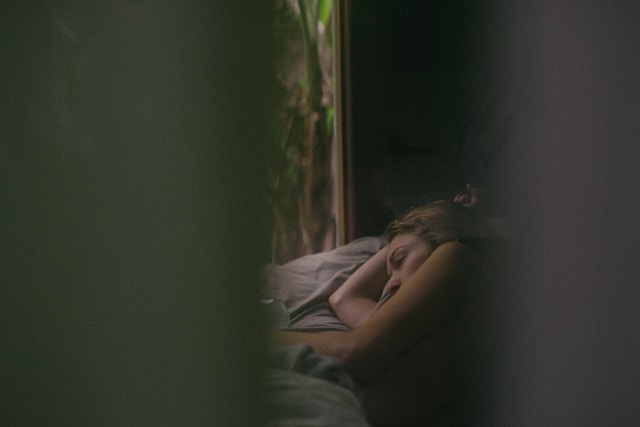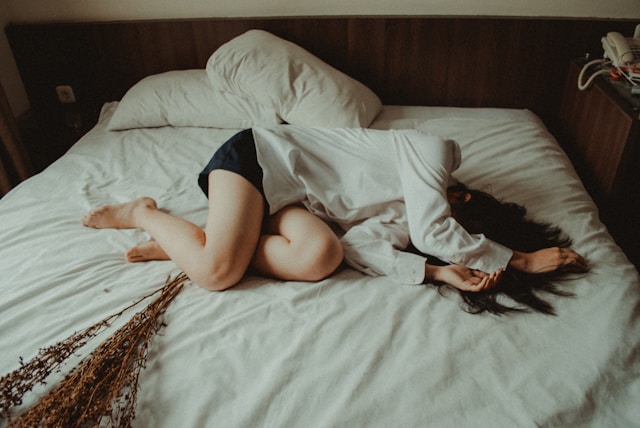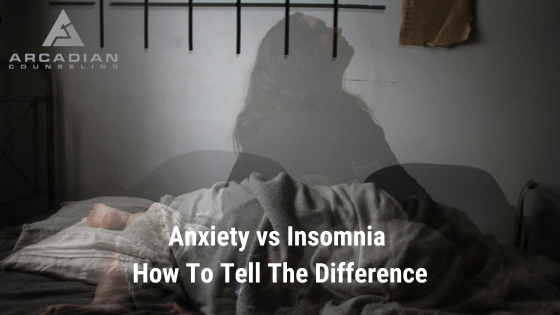We’ve all been there – lying wide awake in bed, staring at the ceiling, wondering why your mind seems to think bedtime is the time to start solving the world’s problems! Your mind races, your bo
dy feels tense and restless, and the clock keeps tick, tick ticking away as you calculate the diminishing hours of sleep while imagining how awful you’re going to feel the next day because you didn’t get enough.
You wonder: is this anxiety or insomnia? The answer isn’t always that obvious because anxiety and insomnia are so closely related that they can often overlap. Understanding the difference anxiety and insomnia can help you address the underlying cause and find the right solution for a better night’s sleep.
What is Anxiety?
Anxiety is more than just feeling worried or stressed. It’s a natural response to stress that can actually help us deal with challenges. However, when anxiety becomes chronic, it can interfere with daily life, including sleep.
When you’re anxious, your body goes into “fight or flight” mode. Of course this is super helpful in dangerous situations, but not so much when you’re trying to sleep! The adrenaline rush makes your heart beat faster, your breathing quicken, and your muscles tense up, making it virtually impossible to relax and drift off to sleep.
What is Insomnia?
Insomnia, on the other hand, is a sleep disorder characterized by difficulty falling asleep, staying asleep, or waking up too early and not being able to go back to sleep. It can be a short-term issue, lasting a few days or weeks (often due to stress or a life event), or it can be chronic, lasting for months or even years.
Folks who struggle with insomnia feel miserable during the day, can’t concentrate, and typically feel irritable, depressed, anxious and often a combination of all three! It’s an excruciating condition because even when you’re exhausted, you can’t sleep and all the while you know you’re just going to feel worse in the morning.
The Connection Between Anxiety and Insomnia

Anxiety and insomnia often go hand in hand. Anxiety can lead to insomnia, and insomnia can worsen anxiety, creating a vicious cycle that can be hard to break.
If you’re lying in bed worrying about things like work, relationships, or health, it’s no surprise that sleep won’t come easily. The more you stress about not sleeping, the harder it becomes to actually fall asleep. Over time, this develops into chronic insomnia, where you start to dread bedtime because you associate it with sleepless nights.
On the flip side, not getting enough sleep only serves to heighten anxiety. When you’re sleep-deprived, your brain doesn’t function at its best, making it harder to manage stress and anxiety during the day. This can lead to even more sleepless nights, and the cycle continues.
Are You dealing with anxiety or insomnia?

Signs It Might Be Anxiety
- Racing Thoughts: If your mind is racing with worries and fears, especially when you try to sleep, it’s likely anxiety.
- Physical Symptoms: Anxiety often comes with physical symptoms like a racing heart, sweating, and muscle tension.
- Generalized Worry: If you find yourself worrying about a wide range of things, not just sleep, anxiety may be the root cause.
Signs It Might Be Insomnia
- Difficulty Falling Asleep: If you’re struggling to fall asleep, even when you’re not particularly worried, it could be insomnia.
- Waking Up Frequently: Waking up multiple times during the night and having trouble getting back to sleep is a hallmark of insomnia.
- Feeling Restless: If you feel like you’re tossing and turning all night without finding a comfortable position, insomnia might be to blame.
Strategies to Manage Anxiety or Insomnia

Practice Relaxation Techniques
Relaxation techniques like deep breathing, meditation, or progressive muscle relaxation can help calm your mind and body before bed. These practices can reduce anxiety and make it easier to fall asleep.
Establish a Bedtime Routine
Creating a calming and consistent bedtime routine can signal to your body that it’s time to wind down. This could look like reading, taking a warm bath, or listening to soothing music.
Limit Stimulants
Avoid caffeine, nicotine, and heavy meals close to bedtime all of which interfere with your ability to fall asleep and stay asleep.
When All Else Fails – Get Some Help
If anxiety or insomnia is disrupting your life and you feel like you’ve tried everything, it’s time to get some help. A well-trained therapist can help you work through your anxiety, or implement strategies such as cognitive-behavioral therapy for insomnia. Your primary physician can prescribe medication for sleep but this should be considered a last resort as these are all habit forming and some are even addictive.
James Killian, LPC is the Principal Therapist & Owner of Arcadian Counseling in Greater New Haven, CT where they specialize in helping over-thinkers, high achievers, and perfectionists reduce stress, increase fulfillment and enhance performance so they can move From Surviving To Thriving.

